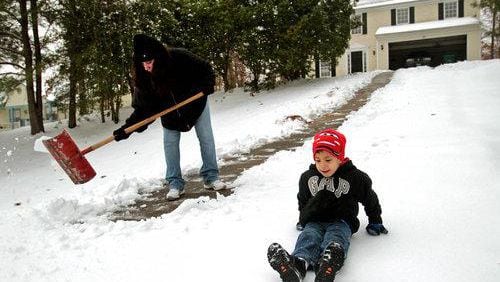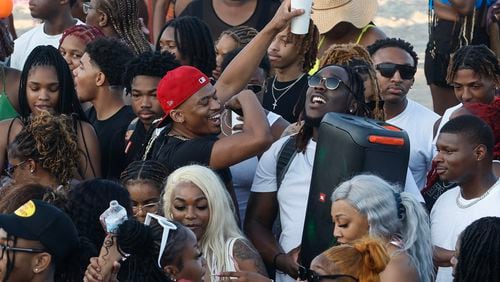As children many of us recall watching the evening news or listening to the morning weather radio reports to find out if the white flakes wafting from the sky would cause officials to close school for the day. One or two days were a dream, but an entire week brought about severe cabin fever from being away from structure and near-amnesia when we return to the books.
With technology comes the opportunity to inject some learning into those days of snowball fights and hot cocoa. At least two metro Atlanta systems — Gwinnett and Forsyth — have begun implementing a program where teachers teach from afar and students still have access to much of the support they need.
Although face-to-face interaction is idea, proponents say it’s better than adding an additional half hour to some days or tacking on time to the end of the school calendar. Critics say the “lessons” amount to nothing more than busy work and it does little for students.
What do you think? Should all school systems have plans in place to allow students to keep up with curriculuum when acts of God keep them out of the schoolhouse?
Send comments to communitynews@ajc.com. Responses may be edited for length and/or clarity and may be published in print or digital platforms.
LAST WEEK: SHOULD SHORT-TERM RENTALS BE REGULATED, TAXED?
Sandy Springs is considering regulating short-term rentals – people listing their homes on internet sites like Airbnb and VRBO for stays of less than 30 days. But proposed state legislation, House Bill 579, would bar cities from regulating or prohibiting the practice. Should community harmony or private property rights prevail? Here's what some readers had to say:
I live on Lake Lanier in Flowery Branch. Two years ago, a house on our street with a dock and lake access was sold to an owner who started renting it by the week. For several months that year, our neighborhood was turned into party central: Illegal parking everywhere, speeding, property damage, trash everywhere, music and noise throughout the night. After about six weeks, our community was able to put an end to this destruction of our peace and quiet because Hall County has restrictions on short-term rentals. HB 579 would remove our protection. Zoning should be a local issue. Local government should be the force that controls land use and local business regulations. Imposing state regulations is an overreach of power. Not all neighborhoods are the same, and they should not be regulated by an agency that is far removed from the community. – Tom Vivelo
My wife and I operate an Airbnb rental in Union County (Blairsville). Our unit is a one-bedroom basement apartment. Let me describe the guests we entertain. They are young couples, with and without children. They are college-age students. They are hikers taking advantage of the vast number of hiking trails here in the North Georgia mountains. They are retirees traveling and sightseeing, and on occasion, we have foreign visitors. We enjoy meeting our guests and hearing their stories. We are "on site" hosts, greeting each guest personally. For the past two years, we averaged 150 booked nights. The vast majority of our bookings are for two nights, with three- and one-night bookings a close second. My opinion on HB 579 would be that the private homeowner's rights should prevail. – Steve Psiaki
I believe that we should regulate homes that have been turned into businesses. Renting a single room, even regularly, or to a family once or twice a year is one thing. Renting to all comers, related or not, for short stays turns a home into a football hotel, party house or business hotel. It should be zoned and regulated like a Hilton. – Jeff Bell
We moved into our sleepy north Roswell community some 30 years ago and have had the same neighbors for that length of time. Last year, our next-door neighbor sold their home due to age/health issues to an out-of-town couple. The couple immediately listed the home on Airbnb. Since then, it has been a revolving door of out-of-state tags and constant strangers coming and going. My real issue is that we have a cabin in North Georgia and are home only 50 percent of the time. This forced me to place a camera system around my home and "No Trespassing" signs on the fence surrounding our pool. If the state wants to charge these rentals a hotel tax, have at it. But where these short-term rentals are allowed to operate should be left to the local governments representing their residents. – Ken Mayers
Our neighborhood now has an unofficial "boarding house," which may even be worse than visitors in short-term rentals. A quiet, family-oriented neighborhood adjacent to an elementary school is NOT the place for young people who need a place to rent for several weeks. With apartments, regulations and expectations are known. A neighborhood home rented to individuals, several in one house, is something that each community needs to decide, since safety, parking, traffic and home values are at stake. I sincerely hope our state legislators will NOT bar cities like Sandy Springs from regulating their own homeowners' needs, and that they vote against HB 579. We need to decide whether we're a residential or a business district, not the state. – K.O. Roper
If a homeowner rents out a spare room, that is a residential function, like the traditional taking in of a boarder or getting a roommate. If the owner vacates the premises for the renters, or never lives there at all, then that is a hotel function and the home becomes a business. We know some properties are owned by investors simply to use as rentals. Having a long-term tenant is one thing, but a house rented out for parties or to a different tenant every week is a hotel and not appropriate in a residential neighborhood. – Angie Simpson
I own a home in a small town in northern Michigan where this topic was vigorously discussed several years ago and ultimately passed, not by a vote of the residents, but by the village council. The town, Elk Rapids, is on a bay of Lake Michigan and is a popular destination for visitors in the summer. With this in mind, homeowners (both year-round residents and "summer people") wanted to cash in on the prospect of money made from short-term rentals. I live in Vinings and was, along with many year-round homeowners in Elk Rapids, against short-term rentals for the following reasons: They discourage investment in homes and communities, and have a major impact on the stability, quality of life and schools in a municipality. Who will invest in a home, in a neighborhood, when you have no idea who your neighbors are or what the long-term prospects are for the growth of that investment? Families looking for stability and growth for their investment and safety for their children do not want to live in a community where their neighbor is an absentee landowner who allows a revolving door of temporary tenants for profit. I can guarantee that if (HB 579) is passed, Sandy Springs and all other communities looking to establish a desirable place for families, schools and businesses to thrive will find the exact opposite occurs. – Janet Filip
As the president of the HOA for our townhome community, I can unequivocally express my opposition to short-term rentals in an otherwise single-family-home community. That being said, I along with 15 other friends enjoy the annual pilgrimage to Hilton Head where we rent a beautiful home – more like mansion – for a week of golf and frivolity. The home we rent is one of three built on a postage-stamp lot, with clearly the intent of housing vacationers year round. These three homes are not in an established community of single-family homes, but are in fact down the street from a large resort. The point being, short-term rentals should be available in areas where there is a destination appeal. With creative zoning, local governments could set up areas where short-term rentals are enabled. I could see a zone near or in the downtown areas of Roswell, Alpharetta, Atlanta or Decatur, but to enable a homeowner to invest in a short-term rental business in a single-family-home community with no apparent destination appeal to me runs contrary to any societal norm. – Christopher Goodrich
I used a VRBO rental in California for family members in town for a wedding, and it worked out well compared to hotel rooms for all of us. It was a large Victorian house in a residential neighborhood. VRBO et al is a handy way to find a rental while traveling that has home-like advantages, such as kitchen for meal prep, and being in a residential area rather than hotels that are more institutional. That being said, I understand neighborhood residents and cities objecting to short-term rentals. Most places have zoning codes for home businesses, which this essentially is. Typically, a home business can't have employees, traffic and so forth. Short-term rentals should come under zoning/home business codes so they can be regulated and inspected to ensure safe environments for visitors and residents. – Meg Perry
About the Author






